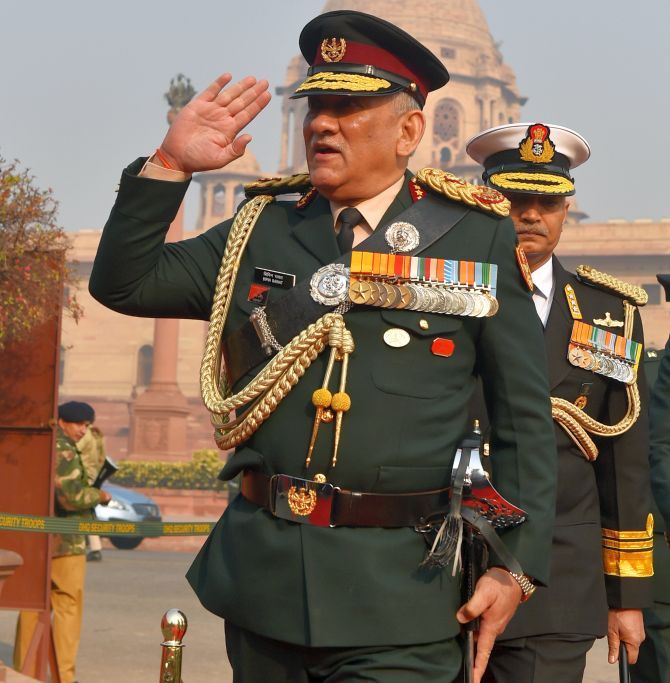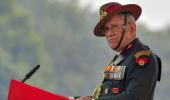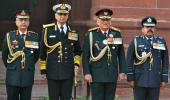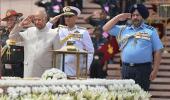'Is the appointment of a CDS likely to achieve the creation of battle-ready, tri-service military commands, from the current 17 single-service commands?', asks Ajai Shukla.

On New Year Day 2020, the army has its 28th chief, General Manoj Mukund Naravane, and the military its first Chief of Defence Staff, General Bipin Rawat.
Congratulating General Rawat, who he described as 'an outstanding officer who has served India with great zeal', Prime Minister Narendra Damodardas Modi tweeted: 'This institution carries tremendous responsibility of modernising our military forces'.
Modi also acknowledged that the ministry of defence, as it earlier existed, was short of military domain expertise. He tweeted: 'Creation of the Department of Military Affairs with requisite military expertise and institutionalisation of the post of CDS… will help our country face the ever-changing challenges of modern warfare'.
Several questions remain, however, over General Rawat's role and functions.
Is the CDS the commander of all three services -- army, navy and air force?
Yes, at a purely ceremonial level. In rank and salary, General Rawat will remain the equal of the army, navy and air force chiefs, with the government having notified the CDS in 'the rank of a four star general with salary and perquisites equivalent to a service chief'.
However, he will also be the ex officio 'Permanent Chairman, Chiefs of Staff Committee' -- a body that includes all three service chiefs.
As its permanent chairman, General Rawat will be the first amongst these equals, like an elder in a gentlemen's club. However, the government has specifically stated: 'CDS will not exercise any military command, including over the three service chiefs'.
General Rawat's second and more consequential role, from where he will draw substantive power over the services, will be as head of a new 'Department of Military Affairs' in the MoD.
In this capacity, he will oversee substantive matters relating to the three services, including promotions, postings and foreign assignments. This will translate into enormous clout.
Who will be senior, the CDS or the defence secretary?
In rank, precedence and salary, General Rawat -- like the three service chiefs -- will be senior to the defence secretary, since service chiefs are the seniority equivalent of the Cabinet secretary.
Traditionally, the defence secretary, who heads the department of defence, enjoys greater importance than the MoD's other four secretaries -- who head the department of defence procurement, defence research and development, ex-servicemen's welfare and defence finance.
In the Allocation of Business Rules, the defence secretary is responsible for the 'defence of India'.
Though the defence secretary has shed many of his responsibilities to the DMA, he retains responsibility for the defence of India and for making 'defence policy'.
He also remains responsible for all capital procurements from the defence budget. It is likely that, while the CDS will be nominally senior to the defence secretary, the latter will remain more influential.
Is the appointment of a CDS a masterstroke that will achieve defence modernisation?
As CDS, General Rawat can improve tri-service coordination and economise by eliminating duplication of military resources and facilities. He can also improve the military's operational readiness by prioritising procurement of more urgently needed equipment.
However, while obtaining more bang for the buck, he can do little about the primary obstacle to modernisation -- which is a defence budget that is under 16% of the central government's expenditure.
This is inadequate for equipping the military with sufficiently modern weaponry. Nor is the defence allocation likely to rise in absolute terms, given the current 4.5% economic growth rate.
Is the appointment of a CDS likely to achieve the creation of battle-ready, tri-service military commands, from the current 17 single-service commands?
The government has formally given the CDS the task of 'restructuring of military commands for optimal utilisation of resources by bringing about jointness in operations, including through establishment of joint/theatre commands'.
This would greatly improve the operational posture of the three services and create a culture of integrated tri-service operations. However, there is deep institutional resistance to creating theatre commands, especially from the air force.
Asked on Wednesday whether he would be able to change entrenched mindsets, General Rawat was cautious. 'That is something we will have to study. We will work with the three services and I'm sure we will come out with a mechanism that will suit the Indian system. We don't have to copy systems (of tri-service integration) from other countries, we will do what suits us best,' General Rawat said.
In 2001-2002, a group of ministers recommended that a CDS be appointed to serve as a single point military advisor to the government. Has that been achieved?
Not really. The CDS notification states he 'will act as the principal military adviser to Raksha Mantri on all tri-services matters. The three chiefs will continue to advise RM on matters exclusively concerning their respective services'.
This compromise serves a dual purpose. It reduces resistance within the three services to creating a CDS, by preserving the three chiefs's access to the RM. At the same time, it reduces the government's reliance on a single-point advisor.
The army, navy and air force chiefs would be able to provide the RM with greater domain knowledge about their respective services, allowing the CDS to focus on tri-service coordination.












 © 2025
© 2025